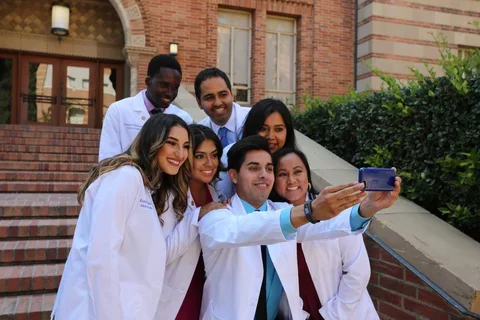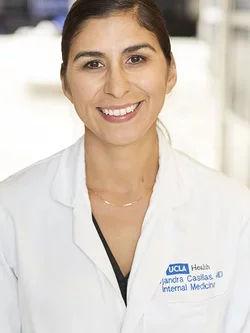They got into medical school, but first-gen students still face barriers
Awareness has been increasing on specific adversity that first generation college students face.

Higher education, especially when it comes to law and medicine, is thought of as an equalizer – propelling individuals from under-resourced backgrounds to an upper echelon of society. However, awareness has been increasing when it comes to the specific adversity that first generation college students face as they progress in academia.
In essence, the idea of higher education as the great equalizer is a myth. And yet, little attention is typically paid to “first gen” students once they are in prestigious graduate programs like medical school, especially from a research perspective.
A recent manuscript published in JAMA Network Open by Alejandra Casillas, MD, MSHS, of UCLA’s Department of Medicine, and others, presents empirical qualitative evidence on the barriers that first generation college graduates face in medical school, based on conversations with 37 first-generation college graduates in medical school from across 27 institutions.
The authors analyzed these barriers that emerged from semistructured interviews and found four major themes:
1) Isolation and exclusion,
2) Challenges with access to resources,
3) Lack of institutional support,
4) Need to self-rely on grift and resilience to survive.
The publication stems from a research collaborative connected to an AAMC workgroup on First Generation College Graduates (First Gen) In Medicine that Dr. Casillas helped form, bringing together researchers across the country interested in studying the experiences of medical students who were first in their family to graduate from college.

“The ironic part” about succeeding in higher education is that “the higher you move up the ladder, the more your community of fellow first gen college graduates shrinks,” says Dr. Casillas, who is a first generation college graduate herself.
This paradox is corroborated by the stories of current first generation college graduates in medical school, such as UCLA Latino medical students Irvin Garcia and Alexis Aleman. It’s also been validated by early existing research, such as a 2023 UCLA study that found that found that Black, Hispanic, and Native American students who took the Medical College Admission Test (MCAT) were ultimately less likely to actually apply to college due to a range of barriers, one of them being having parents without a college degree.
It wasn't until recent years, however, that this dynamic began to gain recognition, and that awareness and support began growing for first generation students in medical school, with UCLA one of the first institutions to lead the way under Dr. Casillas’ leadership.
Her own experience
When she returned to the DoM faculty in 2016, Dr. Casillas didn’t plan on being the person to spearhead such initiatives. But after mentoring other first gen students, she heard her own story and struggles mirrored back to her:
“I remember feeling isolated, like an outsider,” Dr. Casillas says. “My parents are amazing people and are my role models, but I was not equipped with the socio-cultural capital that is also part of being successful or that allows people certain privilege or entry into certain opportunities.
“I remember feeling that this meant it was because I was deficient in some way. And there was no word or term to name this experience (the First Gen experience was less talked about back then, even stigmatized).”
In response, Dr. Casillas partnered with UCLA's undergraduate program "FirstToGo" to host an initial event for first-gen medical students at the David Geffen School of Medicine. What was proposed as a small lunch session ultimately became an emotional event attended by hundreds.
“We had close to 200 students from across all years show up with very little notice,” Dr. Casillas shared. “We launched this discussion of being a first-year college graduate at the medical school and all these rich details and threads came out -- along with tears.”
From that, UCLA DGSOM's “First Gen” student group was born.
“I am so grateful we can name the experience for our First Gen community,” says Dr. Casillas, “and instead of feeling stigma, show that their struggles and life experiences are a picture of empowerment and persistence.”
DGSOM is the first graduate school at UCLA to have an organization dedicated to first generation students, and one of the first medical schools in the country to have such a group or even programming for this demographic. It’s contributed to first-gen students choosing UCLA for their medical training, Dr. Casillas says.
"When you look at our incoming class now, at least 50% of the students are first generation,” Dr. Casillas observes. “We’ve really gained this reputation nationally, and in a big way.”
She is now continuing to implement similar programming across the UCLA DoM, because she believes First Gen awareness, support and community building shouldn’t stop with students, but be applied to staff, trainees and even faculty.
"Places of higher learning and the academic ivory tower weren't originally built for people like us [first gen]. It's great that our UCLA community is evolving, but in response our institutions need to change to meet the needs of the new face of academia, and of medicine” she says.
“That's where the importance of the evidence [like this study] comes in, so we shift our academic and health systems in the right direction."
Read more:
What obstacles hinder many aspiring med students?
2 first-generation Latino medical students go viral on Instagram
Take the Next Step
Learn more about the First-Gen @ UCLA David Geffen School of Medicine program.



